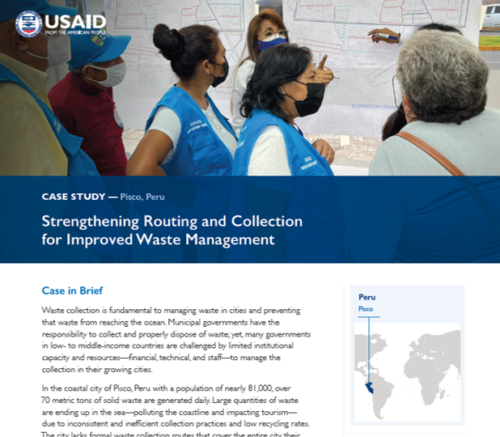Strengthening Routing and Collection for Improved Waste Management


Waste collection is fundamental to managing waste in cities and preventing that waste from reaching the ocean. Municipal governments have the responsibility to collect and properly dispose of waste; yet, many governments in low- to middle-income countries are challenged by limited institutional capacity and resources—financial, technical, and staff—to manage the collection in their growing cities.
In the coastal city of Pisco, Peru with a population of nearly 81,000, over 70 metric tons of solid waste are generated daily. Large quantities of waste are ending up in the sea—polluting the coastline and impacting tourism— due to inconsistent and inefficient collection practices and low recycling rates.
The city lacks formal waste collection routes that cover the entire city, their large garbage trucks are unable to collect waste along narrow, dead-end, or deteriorated streets, and end up traveling longer distances, using more fuel, and generating more emissions. To establish more dependable collection
practices and mitigate ongoing impacts from the growing volume of waste, the United States Agency for International Development’s (USAID) Clean Cities, Blue Ocean program partnered with the local government in Pisco, Peru to develop a reliable and effective waste collection and routing system that is now serving previously unserved parts of the city, maximizing city resources by reducing the costs associated with duplicative routes, and decreasing the extent of street litter entering the environment and our ocean.
To improve efficiencies, new routing plans have been developed in all eight districts in Pisco, expanding waste services to 19 percent more of the population (nearly 12,800 additional residents) using the same collection vehicles—with the same workers in less time—and reaching 100 percent waste collection coverage. With the optimized routes, the city of Pisco can collect an additional 12 metric tons of garbage per day. The model that Clean Cities, Blue Ocean used to optimize routing and collection in Pisco can be tailored to other cities’ unique contexts, and the program has initiated similar efforts in Sri Lanka, the Philippines, and Vietnam.

